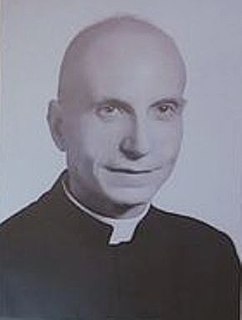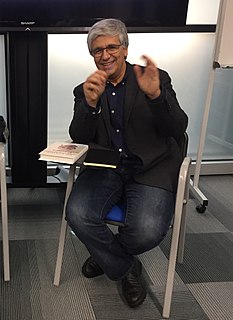Related Research Articles
The Viareggio Prize is an Italian literary prize, first awarded in 1930. Named after the Tuscan city of Viareggio, it was conceived by three friends, Alberto Colantuoni, Carlo Salsa and Leonida Rèpaci, to rival the Milanese Bagutta Prize.

Costanzo Preve was an Italian philosopher and a political theoretician.

Gianfranco Miglio was an Italian jurist, political scientist and politician, founder of the Partito Federalista. For 30 years, he presided over the Political science Faculty of Milan's Università Cattolica. Later on in his life, he was elected as an independent member of the Parliament to the Italian Senate for the Lega Nord. The supporters of Umberto Bossi 's party called him Prufesùr, a Lombard nickname to remember his role.

Bruno Paolo Vespa is an Italian television and newspaper journalist.
Terrorism in Italy from 1945 To Date is a book written by Giovanni Pellegrino, an Italian lawyer and politician. It discusses the political situation in Italy from the revival of democracy in 1945 until the present day.

Arrigo Petacco was an Italian writer, historian and journalist.

The Perfect Fusion was the 1847 act of the Savoyard king Charles Albert of Sardinia which abolished the administrative differences between the Mainland states and the island of Sardinia, in a fashion similar to the Acts of Union between Great Britain and Ireland in 1800.
The Acqui Award of History is an Italian prize. The prize was founded in 1968 for remembering the victims of the Acqui Military Division who died in Cefalonia fighting against the Nazis. The jury is composed of seven members: six full professors of history and a group of sixty (60) ordinary readers who have just one representative in the jury. The Acqui Award Prize is divided into three sections: history, popular history, and historical novels. A special prize entitled “Witness to the Times,” given to individual personalities known for their cultural contributions and who have distinguished themselves in describing historical events and contemporary society, may also be conferred. Beginning in 2003 special recognition for work in multimedia and iconography--”History through Images”—was instituted.

Enzo Giudici was an Italian academic who specialized in French Renaissance literature, particularly Louise Labé and Maurice Scève. Giudici was also a publicist often compared with fascism.
Pietro Trifone, is an Italian linguist.
Gianlorenzo Baraldi is an Italian costume designer and film producer. He won a Nastro d'Argento for Best Scenography and a David di Donatello for Best Sets and Decorations for the film Il Marchese del Grillo by Mario Monicelli in 1982.
Augusto Vittorio Vècchi, known under the pseudonym Jack La Bolina, was an officer in the Regia Marina and a writer on maritime subjects. He has been called "the Italian Captain Marryat".
Maurizio Trifone is an Italian linguist and lexicographer.
Furio Jesi was an Italian historian, writer, archaeologist, and philosopher.
Giuseppe Casarrubea was an Italian historian and author.
The Premio Friuli Storia is an annual Italian literary award established in 2013 to promote standards of excellence in the writing of history books for a general readership. It is the only national Italian literary prize for non-fiction which entrusts the selection of the winner to a committee of non-specialist readers.

Monsignor Vincenzo Regina was an Italian presbyter and historian.

Andrea Tornielli is an Italian journalist and religious writer. He is married and has three children. He has been the editorial director of the Dicastery for Communication since December 2018.
The organization officially known as Volante Rossa "Martiri Partigiani", often mentioned simply as Volante Rossa, was a clandestine antifascist paramilitary organization active in and around Milan in the postwar to the Second World War, from 1945 to 1949. Led by "tenente Alvaro", nom-de-guerre of Giulio Paggio, it was made up of communists partisans and workers who aimed with their actions to build a continuity with the wartime action of the Italian Resistance.
Salvatore Lupo is an Italian historian and author from Siena, specializing in the Sicilian Mafia.
References
- ↑ Bio (in Italian) Archived February 14, 2013, at the Wayback Machine
| | This biographical article about an Italian historian is a stub. You can help Wikipedia by expanding it. |